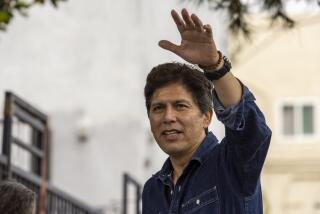Caught in a Smoke Ring
- Share via
The list of defendants in the class-action lawsuit includes all the well-known giants--American Tobacco, Lorrilard, Philip Morris, R. J. Reynolds, the Liggett Group and Brown & Williamson.
It also includes the name of a somewhat less familiar manufacturer and purveyor of tobacco products--Gilberto Leon.
Using state-of-the-art factories that sprawl over dozens of acres, the six big companies manufacture and sell about 90% of the nation’s annual production of more than 600 billion cigarettes and 2 billion cigars. The total sales are well over $60 billion a year.
In his drab, 8-by-50-foot shop on Los Angeles’ 6th Street, a couple of doors west of Western Avenue, Leon turns out about 20,000 handmade cigars a year, which he sells for a total of $35,000 to $50,000.
That is not a lot of money for a business that imports its raw materials from the Caribbean and employs four people. But we’re not talking about smuggled-in, $50 Cuban Hoyo de Monterreys, the kind smoked in Century City law offices. Leon’s cigars are more modestly priced--$1.75 to $5 apiece--the kind smoked by discerning truck drivers and devoted Los Angeles police officers.
Nonetheless, along with the big firms, Leon now stands accused by the Health and Welfare Trust of the Operating Engineers Local 12 of fraud and unlawful business practices in the production and sale of tobacco products.
In a lawsuit filed on behalf of its 35,000 members, their dependents and others similarly affected, the union accuses the big six, Leon and several additional defendants of “having taken these actions even though they have known for years, based on their own secret research, that their products eventually injure or kill the consumer.”
Getting the 76-year-old refugee from Fidel Castro’s Cuban revolution to comment on the lawsuit’s accusations is not easy. He is a man of few words, either in his native Spanish, which he doesn’t use much, or in English, which he uses even less.
But after persistent prodding, Leon finally acknowledged through a translator that the whole thing strikes him as unfair.
“This is a small place,” he said. “I don’t advertise--my customers come to me. I have this sign [with the surgeon general’s warning]. I have no idea why they want to sue me.
“But I have no reason to fear,” Leon added. “Yo tranquilo.”
It is hard to imagine him engaging in any secret research--the shop is too small and crowded for that. And because he seldom talks and never advertises, it is also hard to figure out how he is supposed to have misrepresented the safety of his products.
Jack R. Ormes, the Pasadena lawyer who filed the lawsuit in September in Los Angeles Superior Court, conceded this week that “some of the language may not apply to all the defendants.”
“It’s just legalese,” Ormes said.
Why was Leon included at all?
“Basically, we’re saying that anyone who puts a tobacco product on the market without [adequate warning of the hazards] is responsible, whether a small manufacturer or a large manufacturer,” Ormes said. “The same principle applies to all.”
Isn’t the inclusion of a little guy like Leon a strategy that could backfire?
“We didn’t want to let the big guys say we were picking on them; that we hadn’t sued the little guys, too,” Ormes said. “We’re not discriminating. We pick on everybody.”
Two of the others who got picked on are the La Plata cigar shop on Grand Avenue in downtown Los Angeles and Mursuli’s Cigars on Lower Azusa Road in Temple City, both of which operate on a scale akin to Leon’s.
Victor Migenes Jr., whose father founded La Plata, was one of several who said that picking on little operators will only win them sympathy.
“It’s really dumb,” Migenes said.
Bill Solana, manager of Mursuli’s, was philosophical.
“Everybody’s suing everybody these days,” he said. “It’s a sign of the times.’
Jerry Koskie, 38, an unemployed truck driver who describes himself as a faithful Leon customer, was less restrained.
“I’m angry, really angry,” Koskie said. “They’re threatening my cigar supplier.”
Koskie described the whole affair as “one of those sneaky lawyer tricks.”
“This guy busted his rear to get out of Cuba, and now they’re hammering on him,” Koskie said. “That just ain’t right.”
More to Read
Sign up for Essential California
The most important California stories and recommendations in your inbox every morning.
You may occasionally receive promotional content from the Los Angeles Times.










